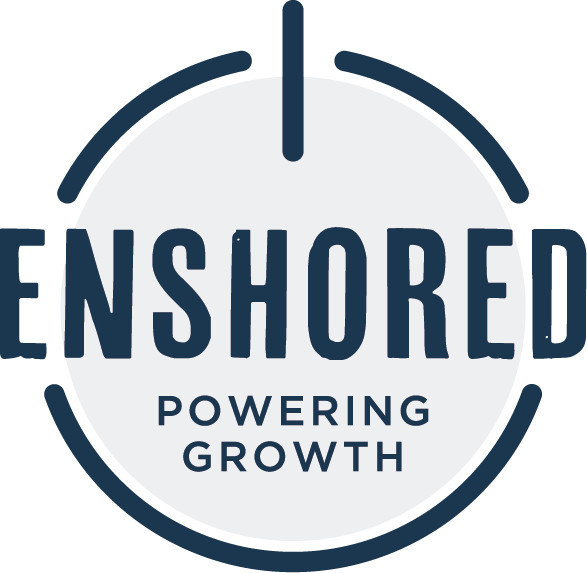Taking too long? Close loading screen.


Outsourcing customer service can enhance efficiency, reduce costs, and improve customer satisfaction. By selecting the right partner, setting clear goals, and maintaining control, businesses can reap significant benefits.
Feeling overwhelmed by increasing customer service demands? Outsourcing customer service can transform your business by enhancing customer satisfaction, scaling operations, and cutting costs. At Enshored, we know the intricacies of successful outsourcing and how to maximize its benefits.
Outsourcing isn’t just about hiring a vendor; it’s about forming a strategic partnership that evolves with your business needs. In this post, we’ll guide you through the steps to outsource customer service effectively, ensuring your business thrives while keeping customers happy.
Outsourcing is a buzzword you’ve probably heard a lot, but what does it actually mean for businesses like us? Simply put, it’s when a company hires another business to handle certain tasks, often to save money or access specific expertise. For us at Enshored, it’s all about offering top-notch customer service solutions to other companies.
Businesses decide to outsource for a variety of reasons. It’s not just about cutting costs, although that’s a significant factor. Here are some of the main reasons companies look to outsource:
These benefits can lead to higher efficiency and better outcomes for businesses that choose to outsource wisely.
When it comes to outsourcing, there’s a vast array of services that companies can delegate to vendors like Enshored. Some of the most common include:
These services are crucial for the smooth operation of a company but can be resource-intensive. Outsourcing offers a practical solution.
Outsourcing is a strategic decision that, when done right, can offer significant advantages to a company. It’s about finding the right partner to enhance your business’s capabilities, allowing you to focus on what you do best. At Enshored, we’re committed to being that partner for our clients, offering them the expertise and support they need to thrive.
Deciding whether to outsource customer service is a big step for any business. It’s about understanding your needs and how outsourcing fits into your growth plans. Enshored is here to help you navigate this journey.
Sometimes, knowing when to outsource can be tricky. But there are clear signs that it might be time to consider it. For example:
Recognizing these signs early can save your business from customer service disasters.
Before deciding to outsource, it’s crucial to weigh the pros and cons. Consider the following:
Evaluating these factors against your company’s internal capacities can help you make an informed decision.
Cost is a significant factor in the decision to outsource, but it shouldn’t be the only one. Here’s what to consider:
Weighing these considerations will help you balance cost implications with the need to deliver outstanding customer service.
Deciding to outsource is a strategic move that requires careful consideration of your business’s needs and the potential benefits outsourcing can offer. By recognizing the signs that outsourcing might be necessary, evaluating your internal capacities against the benefits, and balancing costs with service quality, you can make a decision that supports your business’s growth and customer satisfaction.
Finding the best partner to outsource your customer service is crucial. It’s like picking a teammate who not only understands your game plan but also plays to win just as hard as you do. Let’s dive into what you should look for to make sure you’re choosing the right outsourcing partner for your business.
Several key aspects should influence your decision. These include:
Each of these factors plays a crucial role in ensuring a successful partnership and achieving your customer service objectives.
The location of your outsourcing partner can significantly impact your operations. Consider time zones, cultural differences, and accessibility. Additionally, you should evaluate their expertise and experience in your industry. Having a partner who understands the nuances of your business can lead to better customer service outcomes.
A key aspect often overlooked is cultural compatibility and language skills. Working with a team that understands your customers’ cultural context and speaks their language fluently is invaluable. It ensures smoother interactions and a better overall customer experience.
Finally, assess their technical capabilities and how effectively they can solve problems. This includes:
After considering all these aspects, choosing the right outsourcing partner will significantly impact your ability to deliver outstanding customer service. Enshored has been navigating these waters successfully, ensuring that our partners not only meet but exceed their customer service goals. With a clear understanding of what to look for, you’re well on your way to finding the perfect outsourcing partner for your business.
Creating an efficient outsourcing strategy is crucial for the success of offloading your customer service needs. It’s about finding the right balance between cost-effectiveness and high-quality service. At Enshored, we believe in a tailored approach that meets the specific needs of our clients. Let’s dive into the key elements that make an outsourcing strategy successful.
An effective outsourcing strategy involves several key components that work together to ensure success. These include understanding your needs, choosing the right partner, and setting clear goals.
These elements are the foundation of a strategy that will help you get the most out of outsourcing your customer service.
It’s essential to set clear objectives and expectations with your outsourcing partner from the start. This involves defining what you hope to achieve by outsourcing and making sure your partner understands your goals. Clear communication is key here. It ensures both parties are on the same page and can work towards the same outcomes.
KPIs are vital in measuring the success of your outsourcing endeavors. They help you track progress and identify areas for improvement. Some common KPIs include customer satisfaction scores, response times, and resolution rates. By establishing these indicators early on, you can ensure your outsourcing partner is aligned with your expectations and working towards your business objectives.
Effective communication is the backbone of any successful outsourcing strategy. It’s important to establish clear channels of communication and escalation pathways for addressing any issues that arise. This ensures that any challenges can be dealt with swiftly and efficiently, minimizing the impact on your business.
By focusing on these key areas, you can create an efficient and effective outsourcing strategy that benefits both your business and your customers. Outsourcing customer service can be a powerful tool for growth and efficiency when done right. At Enshored, we strive to make this process as seamless and successful as possible for our clients.
Implementing the outsourcing process for customer service is a critical step. It’s where plans and strategies become actions. Let’s dive into the key aspects to consider.
Ensuring that both parties understand and agree to the legal and contractual obligations is crucial. It protects Enshored and our clients throughout the partnership. Key areas to pay attention to include:
These agreements lay the foundation for a successful partnership.
Bringing the outsourced team up to speed with the company’s products, services, and customer service standards is critical. At Enshored, we focus on:
This ensures that our team can provide the best possible service to your customers.
Staying on top of the outsourcing process as it unfolds allows us to identify and address any issues early on. We emphasize:
This approach ensures that the service remains high-quality and aligned with our clients’ evolving needs.
Trial periods and pilot projects offer a low-risk way to test the effectiveness of outsourcing customer service. They provide:
These initial stages are invaluable for setting the stage for a successful long-term partnership.
Implementing the outsourcing process carefully and thoughtfully ensures that your customer service is in good hands. By focusing on legal considerations, team training, ongoing monitoring, and leveraging trial periods, we at Enshored make the transition smooth and effective. This sets the foundation for a partnership that enhances your customer service and supports your business goals.
Outsourcing customer service is a smart move, but it’s crucial to keep tabs on the process. Here’s how we do it at Enshored.
Trust is key, but verification is a must. Regularly checking in on the outsourced team ensures they meet our high standards. We do this through:
These steps help us maintain the quality of our customer service.
Clear and concise reporting keeps everyone on the same page. We’ve established:
This ensures that we always know how our customer service is performing and where we can do better.
Conflicts and issues are inevitable, but it’s how we handle them that sets us apart. Our approach includes:
This proactive approach helps us quickly resolve conflicts and prevent them in the future.
Protecting sensitive information is a top priority. We ensure:
This commitment to security helps build trust with our customers and protects our reputation.
Maintaining control while outsourcing is essential for the success of our customer service operations. At Enshored, we take this responsibility seriously, implementing rigorous processes and checks to ensure everything runs smoothly and securely. This way, we provide excellent service while keeping both our and our customers’ interests at heart.
Once you’ve set up your customer service outsourcing, it’s crucial to keep an eye on how things are going. Let’s dive into the best ways to measure and evaluate your outsourcing success.
Measuring the success of your outsourcing efforts involves looking at several key areas. Here are a few metrics that can help you gauge how well your outsourcing partnership is working:
By analyzing these metrics, you can get a clear picture of the performance and identify areas for improvement.
Customer feedback is invaluable when it comes to assessing your outsourcing success. Here’s why:
Remember, whether the feedback is positive or negative, it’s all aimed at making your service better.
Making decisions about your outsourcing relationship is crucial. Consider the following factors:
Based on these factors, you can make an informed decision on whether to continue, expand, or end your outsourcing partnership.
Evaluating your outsourcing success is a continuous process that helps ensure your customer service is always on point. By focusing on performance metrics, customer feedback, and a cost-benefit analysis, you can make the best choices for your business and your customers.
Outsourcing customer service, when done right, can significantly boost your business’s efficiency and customer satisfaction. At Enshored, we’re committed to helping you navigate this process with ease and precision. Remember, the right outsourcing partner can elevate your brand and enhance customer loyalty.
Ready to take your customer service to the next level? Contact Enshored today and let’s start building a better service experience together.
Anticipating growth?
Access the tools, tech & team you need to scale globally.

Serious about scaling?
One call is all it takes to know if we’re a fit.
© 2024 Enshored · Privacy · GDPR · California · Cookies · Marketing by Klicker